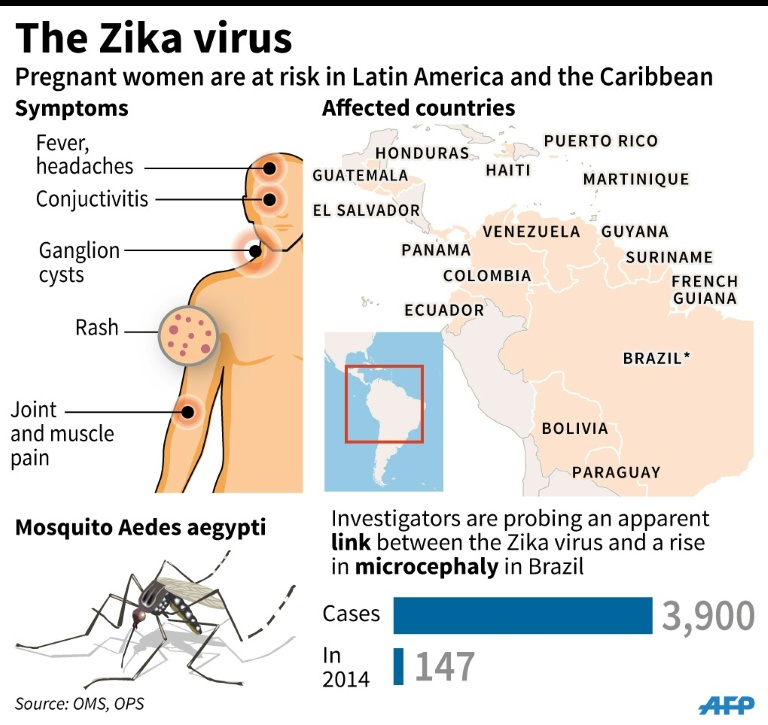Zika virus 'spreading explosively': WHO chief
 |
| Margaret Chan, General Director of the World Health Organisation, speaks about the Zika virus during a WHO Executive Board session at the WHO headquarters in Geneva, Switzerland. (Photo source: Martial Trezzini/Keystone via AP) |
GENEVA: The Zika virus is "spreading explosively" in the Americas and the region may see up to four million cases of the disease strongly suspected of causing birth defects, the World Health Organisation said on Thursday (Jan 28).
As the number of suspected cases of microcephaly - thought to be linked to the virus - surged in Brazil, WHO head Margaret Chan said an emergency committee would meet on Monday to determine whether the Zika outbreak amounts to a global health emergency and how the world should respond.
Microcephaly causes babies to be born with an abnormally small head. Cases have soared in Brazil from 163 a year on average to more than 3,718 suspected cases since the outbreak, and 68 babies have died, according to the health ministry.

Colombia, Ecuador, El Salvador, Jamaica and Puerto Rico have warned women to avoid getting pregnant for the time being.
Jitters over Zika have spread far beyond the affected areas to Europe and North America, where dozens of cases have been identified among people returning from vacation or business abroad.
France - which has logged five cases contracted by its citizens while travelling - urged women not to travel to French overseas territories in South America and the Caribbean.
There is currently no treatment for Zika and a top US health chief warned on Thursday the hunt for a vaccine could take years.
For decades after Zika's discovery in 1947, in a Ugandan forest from which it takes its name, the mosquito-borne virus was of little concern, sporadically causing "mild" illness in humans.
But the WHO's chief Chan told an assembly of member-states in Geneva the severity of the current outbreak was unprecedented. "The situation today is dramatically different. The level of alarm is extremely high," she said, with Zika also possibly linked to a neurological disorder called Guillain-Barre syndrome.
"A causal relationship between Zika virus infection and birth malformations and neurological syndromes has not yet been established, but is strongly suspected," Chan said.
She told WHO members that the virus "is now spreading explosively," in the Americas, where 23 countries and territories have reported cases.
The virus is not known to be transmitted person to person, but the US Centres for Disease Control and Prevention (CDC) said it was aware of one reported case of Zika through possible sexual transmission, and a second where the virus was found in semen two weeks after a man exhibited symptoms.
THREE TO FOUR MILLION CASES
Marcos Espinal, head of communicable diseases and health analysis at WHO's Americas office, said the region could see between three to four million cases - a projection based largely on spread patterns of similar mosquito-borne diseases like dengue fever.
WHO has said it expects Zika to spread to every country in the Americas except Canada and Chile.
According to the CDC, 31 cases of Zika have been documented in the United States since last year. It was not clear if the tally included three new cases reported in New York City on Thursday - one of them a pregnant woman. Three Canadians are also known to have been infected while travelling abroad.
All known North American cases involve people infected while out of the country. However, a recent study in The Lancet suggests the Zika virus could reach regions of the United States in which 60 per cent of the population lives, or some 200 million Americans.
US President Barack Obama has called for swift action to tackle the threat, on diagnostic tests as well as vaccines and treatments.
According to Anthony Fauci, director of the National Institute for Allergy and Infectious Diseases (NIAID), the US government hopes a so-called Phase I clinical trial could begin later this year to test a Zika vaccine in people, but a finished product will take far longer.
OLYMPIC CONCERNS
Brazil has been the country hardest hit so far, and concerns are growing about this summer's Olympic games hosted in Rio de Janeiro.
Six months from the opening ceremony, the government has promised to attack mosquito breeding sites and protect visitors from the virus, from which there is no known prevention method aside from avoiding mosquito bites.
WHO's deputy chief Bruce Aylward told reporters it was "very, very unlikely" it would issue warnings against travel to Brazil, while the head of the International Olympic Committee, Thomas Bach, said it will "do everything" in its power to keep the Games safe from the virus.
Venezuela on Thursday said it had recorded 4,700 suspected cases of Zika - but no related cases of microcephaly.
Honduras also said it had registered 1,000 cases of Zika, which is transmitted by the Aedes aegypti mosquito, the species that also carries dengue, chikungunya and yellow fever.
With concern over travel to Latin America spreading, two airlines in the region announced refund offers to pregnant women booked for travel.
Chilean-Brazilian airline Latam, the region's biggest, will refund or rebook expectant mothers with tickets to any of 22 affected countries or territories, while Chilean company Sky will refund those with tickets to Brazil. US carriers Delta and American Airlines have made similar offers.
What the stars mean:
★ Poor ★ ★ Promising ★★★ Good ★★★★ Very good ★★★★★ Exceptional
Latest News
More News
- Tropical storm Trami leaves at least 24 people dead in Philippines (October 24, 2024 | 17:36)
- Singapore grants conditional approval for solar power import from Australia (October 24, 2024 | 17:27)
- ASEAN digital economy set to reach $2 trillion by 2030 (October 22, 2024 | 15:08)
- Thailand asks Laos to waive visa fee at border checkpoints to boost tourism (October 21, 2024 | 17:23)
- Laos pledges to continue efforts to empower girls (October 21, 2024 | 17:17)
- Chinese electric vehicle maker to build plant in Indonesia (October 21, 2024 | 17:12)
- Vietnam Elevator Association introduces Elevator Safety Application to the world (October 18, 2024 | 09:00)
- A taste of the future - the go-to spot at the Worldchefs Congress & Expo 2024 (October 15, 2024 | 16:11)
- Jakarta to impose household waste levy (October 14, 2024 | 16:49)
- China, Laos plan to build connectivity development corridor with Thailand (October 14, 2024 | 16:19)

















 Mobile Version
Mobile Version